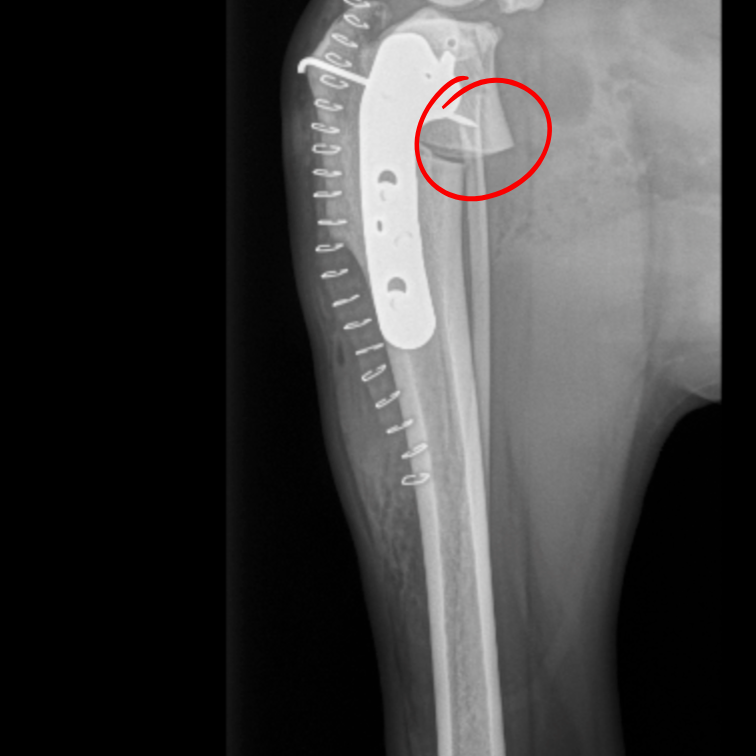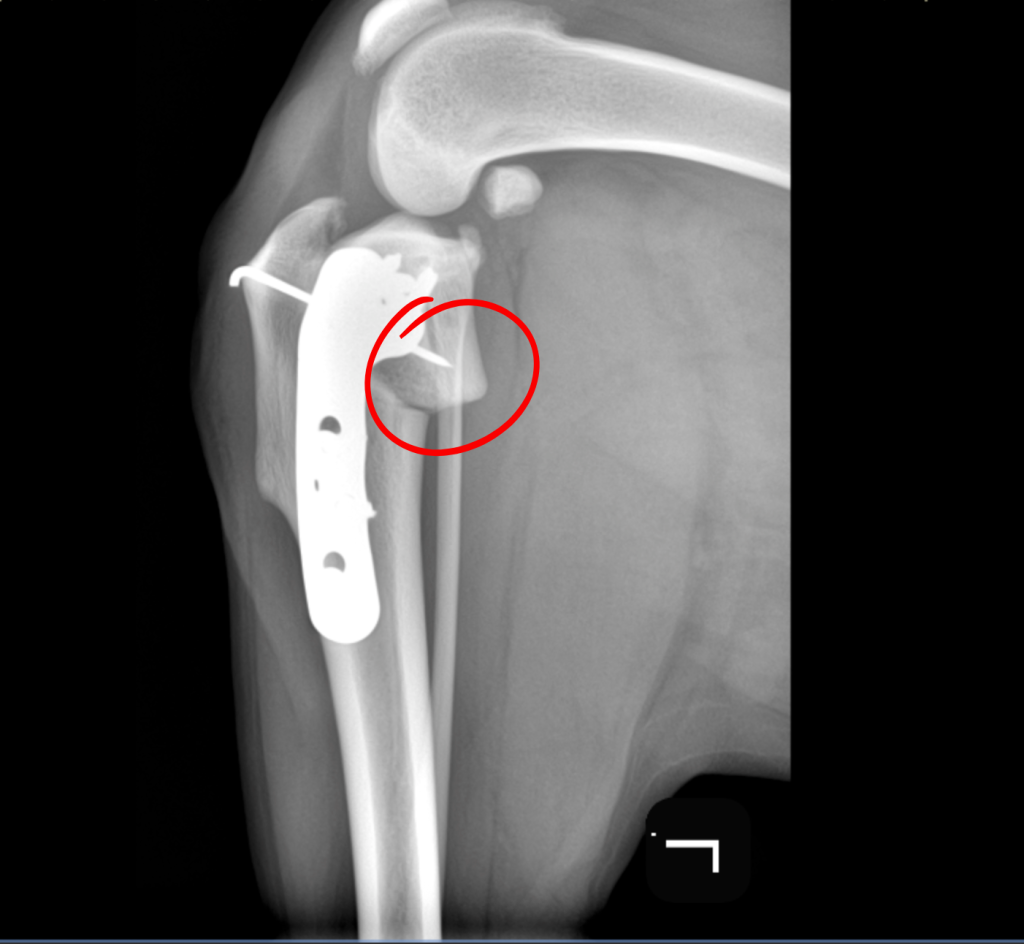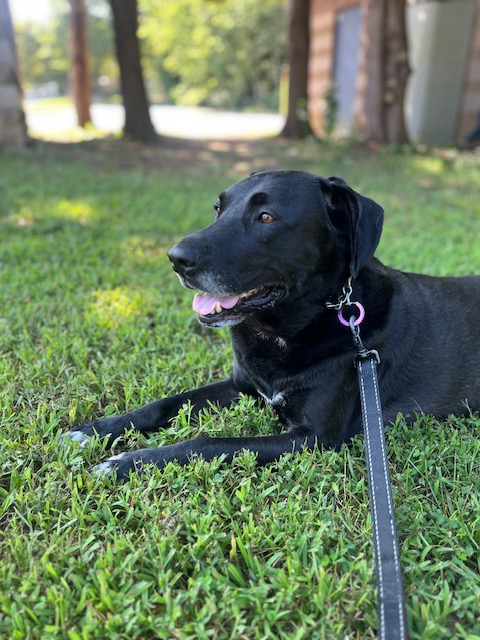For those of you who’ve been asking (and thank you for caring!)—Bandit is officially back on the move.
We recently went to the vet for his six-week post-op follow-up and x-rays. The good news? He’s been cleared to start going on walks again! We’re still a few weeks away from running, playing, or encouraging zoomies, but we’re headed in the right direction.
While we were there, the vet pulled up Bandit’s latest x-rays alongside the ones from six weeks ago. What we saw surprised me and it drove home just how powerful compounding effects can be over time.

The first image showed the bone right after surgery: sharp and clearly defined. But in the second, newer x-ray, that same area looked more rounded. In real time, we’re watching Bandit’s bone disappear.

Let me (try to) explain.
Wolff’s Law (And No, It’s Not a Dog Joke)
According to Wolff’s Law, bones adapt based on the stress and force placed on them. More stress = stronger bone. Less stress = bone weakens.
In Bandit’s case, because he hasn’t been bearing weight on that leg and never will again on part of the bone due to surgery, the bone is literally shrinking in areas where there’s no mechanical load. No pressure, no growth. It’s that simple. According to the vet, if we were to take another X-ray in a few months (please, no), that triangle of bone would likely smooth out completely.
But here’s what really stopped me in my tracks: this measurable decline happened in just six weeks.
Six weeks of reduced stress led to a visible physical change. And that got me thinking not just about my own health (hello, gym) but also about financial well-being.
Compounding: Not Just for Your Portfolio
In the financial world, we often talk about the “power of compounding” to emphasize the importance of starting to invest early. And while that’s absolutely true, Bandit’s x-rays were a striking reminder that compounding works in both directions—positive and negative.
In just six weeks, the changes in his bone health drove home a powerful point: negative compounding forces can have just as much impact as positive ones—and often show results faster. You don’t always need decades to reap the rewards or suffer the consequences.
How Negative Compounding Shows Up
Here’s how the negative power of compounding can show up—physically and financially:
- Don’t move your body? Your body breaks down.
→ Example: Just look at Bandit’s bone loss after a few weeks of inactivity. - Don’t save or invest early? The cost of waiting grows.
→ Example: Want to retire with ~$500,000 by age 65, earning 7% annually?
• Start at 25: Save $200/month
• Start at 35: Save $425/month
• Start at 45: Save $1,000/month - Don’t pay off your credit cards monthly? Interest adds up—fast.
→ Example: With average credit card interest around 22%, everything you bought just got 20% more expensive if carried as a balance. And if you’re only making minimum payments, you’re now paying interest on your interest.
Just like bones weaken without stress, our health declines without care, and our financial strength fades without the right kind of pressure: discipline, consistency, and intention.
The Good News: Compounding Works Both Ways
With time and steady effort, positive momentum builds:
- A small walk builds strength.
→ Example: Bandit’s slow, steady walks are the first step to recovery and the same goes for us. - A small investment grows into wealth.
→ Example: A $50 monthly investment starting at age 25, earning 7%, will grow to nearly $120,000 by age 65. - A small decision leads to a better future.
→ Example: Whether it’s committing to regular savings or working with a financial professional, small intentional actions add up over time.
Want to See Compounding in Action?
Here are two free tools worth checking out:
- U.S. Government Compound Interest Calculator – See how your money can grow over time.
- PowerPay.org – Understand how interest builds on credit card debt and how quickly you can pay it off with a plan.
Your Health Is a Financial Asset
Here’s the other insight I had, staring at those x-rays: Poor health is expensive.
And not just in medical bills, though those are real, and rising. Poor health costs you time, energy, flexibility, freedom. Many of the same things poor financial planning can put at risk.
At Black Dog Wealth, we talk a lot about preparing for the future: saving, investing, planning. But planning only works if you’re around to enjoy the results.
Taking care of your health isn’t just a nice to have; it’s part of the plan.
Your health is your most important compounding asset.
3 Ways to Start Compounding Health & Wealth Today
1. Walk It Off—Literally
Movement is medicine. Even 15 minutes a day can improve your physical and mental well-being. Start small. Stay consistent.
2. Automate Your Savings
Just like a daily walk, even $50/month invested automatically can become something meaningful over time thanks to compounding.
3. Schedule Your Check-Ups
Whether physical or financial, problems are easier to fix when caught early. Regular health screenings and annual financial reviews are both key.
In conclusion, Bandit is on the mend. His full recovery will take time and patience, but he’s moving forward one step at a time. The compounding effect of those small steps will help him build and maintain the strength he needs going forward. And that’s a powerful reminder.
Start small. Stay consistent. Let time do the rest.
Disclaimer:
This article is provided for educational, informational, and illustrative purposes only. It does not constitute tax advice, investment advice, or a recommendation to buy or sell any security. The content is general in nature and may not apply to your individual circumstances. Please consult a qualified tax professional, financial planner, and/or legal advisor for guidance specific to your situation.

